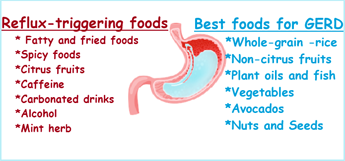What is Acid Reflux Disease?
Gastroesophageal reflux disease (GERD) is a digestive disorder that often causes a burning sensation in the chest known as "heartburn".
In GERD, stomach acid and digestive enzymes flow backward into the esophagus (the food pipe), a condition called acid reflux. This repeated reflux irritates and inflames the lining of the esophagus, leading to discomfort and long-term complications if left untreated.

What Causes GERD?
The lower esophageal sphincter (LES) is a muscular ring located at the bottom of the esophagus. Its primary role is to act as a valve that keeps food and stomach acid from flowing back upward. Normally, the LES opens only when you swallow, allowing food to enter the stomach, and then closes tightly to prevent reflux.
In people with GERD, the LES does not close properly and often remains relaxed. This weakness allows acidic stomach contents to move back into the esophagus. As a result, individuals may experience acid reflux symptoms such as heartburn, chest pain, regurgitation, and discomfort.
GERD trigger foods
Although several factors such as obesity, smoking, and certain medications can worsen GERD, unhealthy dietary choices are among the biggest triggers of acid reflux and should be limited or avoided.
Fatty and fried foods – They stay longer in the stomach and increase the chance of reflux.
Spicy foods, citrus fruits, tomato sauces, and vinegar – Known to intensify heartburn.
Chocolate, caffeine, onions, peppermint, carbonated drinks, and alcohol – Common culprits that relax the LES and promote reflux.
If you eat these foods regularly, try eliminating them for a few weeks to see if symptoms improve, then reintroduce them one by one.
Best Foods for GERD Relief
While some foods aggravate symptoms, others are considered GERD-friendly foods and may help reduce acid reflux:
✅ Vegetables: leafy greens, cucumbers, broccoli, carrots.
✅ Lean proteins: grilled chicken, turkey, fish, and plant-based proteins.
✅ Whole grains: oatmeal, brown rice, couscous, and whole-grain bread.
✅ Healthy fats: olive oil, avocado, nuts, seeds, and fatty fish like salmon and trout.
These options are not only gentle on the stomach but also support overall digestive health.
Best Eating Habits for GERD Management
Along with food choices, adopting acid reflux-friendly eating habits can make a big difference:
Eat smaller, frequent meals – Avoid overeating, which puts pressure on the stomach.
Stay upright after meals – Do not lie down immediately; wait at least 2–3 hours.
Avoid late-night eating – Stop meals 3–4 hours before bedtime.
Limit alcohol, coffee, chocolate, tomato sauce, and fizzy drinks.
Avoid strenuous exercise after meals – Wait a couple of hours before working out.
In Summary
Managing GERD through diet is one of the most effective ways to control acid reflux and heartburn. Avoiding trigger foods such as fried, fatty, and spicy meals while choosing GERD-friendly foods like lean proteins, vegetables, and whole grains can help reduce symptoms.
If dietary changes and lifestyle adjustments do not provide enough relief, it is important to consult a healthcare professional. With a proper GERD diet plan and consistent healthy habits, reflux can be managed effectively, leading to better digestive health.
Medical Disclaimer.
Read further on:
≺≺ What Is the Ketogenic Diet? Is the Keto Diet Right for Everyone?
≺≺ Why should I combine Avocados and Tomatoes?
≺≺ Cholesterol: What Does Diet Have to Do with It?
≺≺ Which food is most associated with helping people live longer?
≺≺ Is Plant-Based Protein the Key to a Longer, Stronger Life?
≺≺ How important is fiber in the diet?
≺≺ What cardiovascular benefits do berries provide?
≺≺ What is the Okinawan diet? What is the secret behind Okinawan long life-expectancy?
≺≺ Ultra-Processed Foods: What They Are, Why They’re Harmful, and How to Cut Back.
≺≺ What grains have the lowest glycemic index?
≺≺ How Important Is Protein for Your Health?
≺≺ is your kid getting too much protein?
≺≺ What foods and vitamins are good for your skin?
≺≺ EWG's- The Clean Fifteen: Fruits and Vegetables with the Lowest Pesticide Levels.
≺≺ What eating strategies work best for losing weight long term?
≺≺ How Do Sugary Meals and Beverages Harm Dental Health?
≺≺ Why Vitamin B12 Is Important for Your Health?
≺≺ What foods should people with high blood pressure avoid?
≺≺ What food is most effective for moderating blood sugar?
≺≺ What are antioxidants? How antioxidants in the fruits and vegetables help in preventing cancers and diseases?
≺≺ How can I reduce the risk of cancer-causing chemicals when cooking or grilling meat?
≺≺ What happens to my blood vessels when I gain weight?
≻≻ Watch this page for more such informative articles on Health, Nutrition, and Wellness.
≻≻-Back to Home page.
Further reading (External Links opens in new window):
≺≺- International Foundation for Gastrointestinal Disorders - Diet Changes for GERD).
≺≺- Harvard Health Publishing - Gastroesophageal reflux disease (GERD).